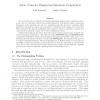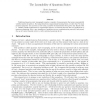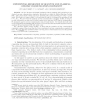7 search results - page 1 / 2 » Advice Coins for Classical and Quantum Computation |
CORR
2011
Springer
12 years 12 months ago
2011
Springer
We study the power of classical and quantum algorithms equipped with nonuniform advice, in the form of a coin whose bias encodes useful information. This question takes on particu...
ECCC
2006
13 years 4 months ago
2006
Traditional quantum state tomography requires a number of measurements that grows exponentially with the number of qubits n. But using ideas from computational learning theory, we...
ICQNM
2008
IEEE
13 years 11 months ago
2008
IEEE
Coin flipping is a cryptographic primitive in which two spatially separated players, who in principle do not trust each other, wish to establish a common random bit. If we limit ...
STOC
2004
ACM
14 years 5 months ago
2004
ACM
Abstract. We give the first exponential separation between quantum and bounded-error randomized one-way communication complexity. Specifically, we define the Hidden Matching Proble...
IPL
2006
13 years 4 months ago
2006
We investigate the randomized and quantum communication complexity of the HAMMING DISTANCE problem, which is to determine if the Hamming distance between two n-bit strings is no l...



